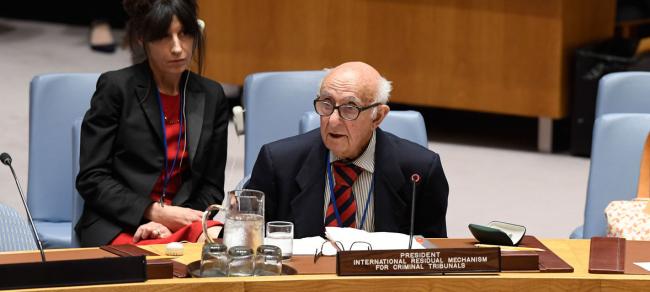
UN court fully assumes remaining functions of tribunals for Rwanda and former Yugoslavia, officials tell Security Council
New York, June 7 (IBNS): Despite challenges and resource constraints, the International Residual Mechanism for Criminal Tribunals is operating without the support of its two predecessors – criminal tribunals for the former Yugoslavia and Rwanda – and has thus assumed the full scope of their residual functions, the legal body’s President told the Security Council on Wednesday.
The functions taken over by the Residual Mechanism include tracking and prosecution of remaining fugitives, retrials, new trials for contempt or false testimony, protection of victims and witnesses, and preservation and management of archives – tasks mandated to the two criminal tribunals.
Highlighting milestones, Judge Theodor Meron, the President of the Residual Mechanism emphasized the adoption, in April, of the revision to the Code of Professional Conduct for the Judges of the Mechanism, by which the Judges may be held accountable for upholding the principles set forth therein.
This development as another example of “the Mechanism’s commitment to best practice and to serving as a model for accountability in all respects,” he said.
On judicial activities, Judge Meron informed the Security Council of the appeal hearing in the Šešelj (MICT-16-99) case and that the appeal judgement in that case, rendered in April. He also spoke of the appeal hearing in the Karadžić (MICT-13-55) case, which took place on 23 and 24 April, and that it is the aim to conclude the case by December, significantly earlier than previously forecast.
Good progress was also achieved in other ongoing cases, including in the retrial in Stanišić and Simatović (MICT-15-96) case and in the ongoing appeal proceedings in the Mladić (MICT-13-56) case.
Judge Meron further informed the Council that the Residual Mechanism transferred eight convicted persons from the UN Detention Facility in Arusha to enforcement States during the reporting period, including four individuals to Senegal and four to Benin.
The Residual Mechanism aims to complete the transfer of all convicted persons under the Mechanism’s jurisdiction in Arusha and in The Hague within this year, he added.
Speaking alongside Judge Meron, Serge Brammertz, the Prosecutor of the International Residual Mechanism for Criminal Tribunals, spoke of the work by the Residual Mechanism in locating the remaining eight fugitives indicted by the International Criminal Tribunal for Rwanda (ICTR)
“The victims of the Genocide against the Tutsi in Rwanda deserve nothing less.”“While the challenges in tracking fugitives are too significant to guarantee a positive outcome, my Office can commit that we will spare no effort,” he said.
Prosecutor Brammertz also informed the Security Council about the search for missing persons in the former Yugoslavia and that many stakeholders took the initiative to raise this issue with his office and seek its assistance.
“Efforts are urgently needed to strengthen the search for missing persons. 10,000 families – from all sides – still do not know the fate of their loved ones,” he added.
The International Residual Mechanism for Criminal Tribunals (Mechanism) was established by the Security Council Resolution in 2010 to complete the remaining work of the International Criminal Tribunal for Rwanda and the International Criminal Tribunal for the former Yugoslavia after the completion of their respective mandates, in December 2015 and December 2017, respectively.
Support Our Journalism
We cannot do without you.. your contribution supports unbiased journalism
IBNS is not driven by any ism- not wokeism, not racism, not skewed secularism, not hyper right-wing or left liberal ideals, nor by any hardline religious beliefs or hyper nationalism. We want to serve you good old objective news, as they are. We do not judge or preach. We let people decide for themselves. We only try to present factual and well-sourced news.







